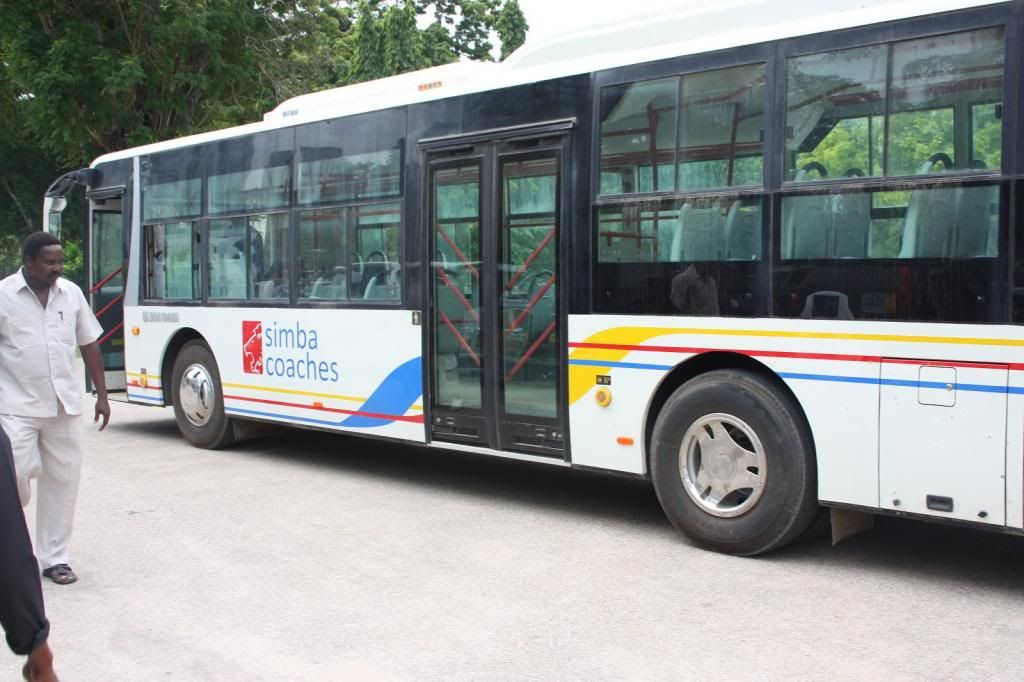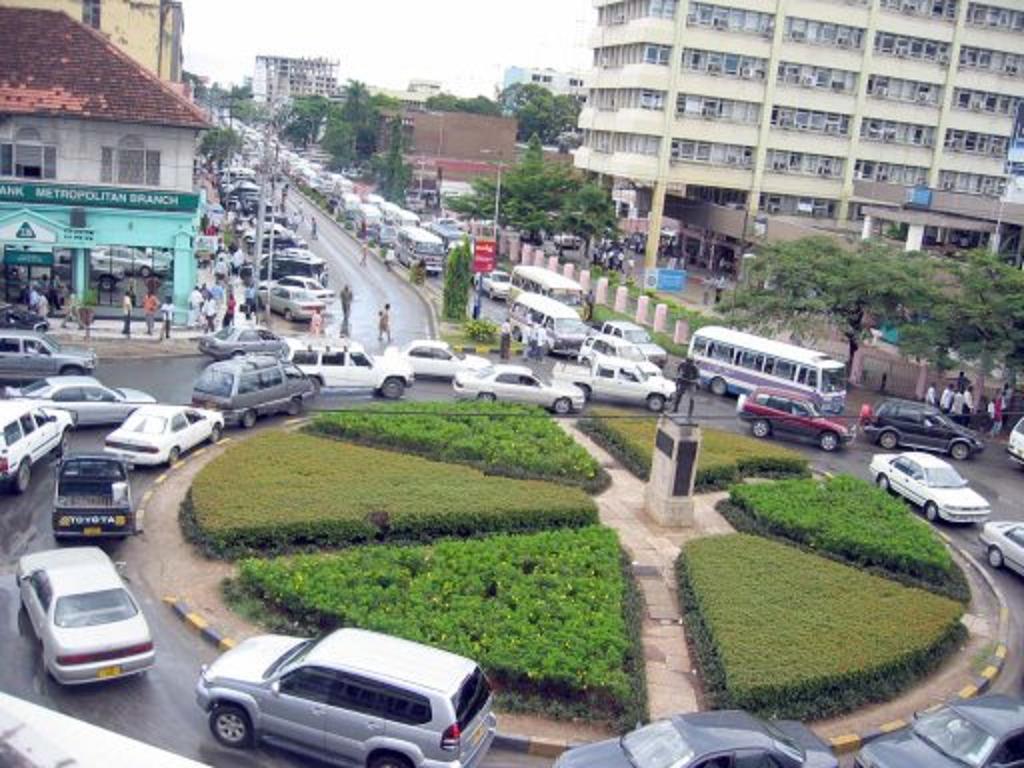The
giant mine team up with local communities to foster social development
By
Damas Makangale, Dar es Salaam, Tanzania
 |
| CEO of Geita Mine-GGM Mr. TerryMulpeter, awarding assistance
building materials in primary school Geita worth Tshs 30Milion Provincial
Mpomvu village of Geita, right is the Head of School Leah Musokwa |
For
instance, in Tanzania we have a number of mining investor who are contributing
heavily to the country's social and economic development such as AngloGold
Ashanti Limited (AngloGold Ashanti).
The
firm is the largest gold producer in Africa, with further operations around the
globe. Geita Gold Mine is AngloGold Ashanti's wholly owned and managed
operation in Tanzania.
It
is also the largest single gold mining operation in its annual gold production
and Tanzania’s most productive mine and the mine is located in North West
Tanzania, near the shores of Lake Victoria.
AngloGold Ashanti has invested over Tshs
1.8Trillion (US$ 915 million) in Geita Gold Mine since 1999 – 2013 alone and
Geita Gold Mine is an open cast mine with three active pits.
It currently employs over 3,500 people both
directly and indirectly, with a further 155 casuals and apprentices.
Approximately 95% of these employees are Tanzanian. Geita Gold Mine has paid
over Tshs 1.5 Trillion (US $790 million) in direct contributions to the
Tanzanian government through taxes and royalties since 2000 -2013.
According
to Geita Gold Mine (GGM), Managing Director, Mr. Terry Mulpeter said that is
proud of its positive social investments and the mine will continues to work
hard to ensure their host community will be better off for everybody who is
there.
Financial
and Operational Performance
Gold
production for the 2nd Quarter was 131,549 ounces against a budget of 126,601
ounces, making production 103.9% achievements against the budget.
Direct
cash operating costs were US$ 506/oz compared to the set budget of US$ 651/oz.
Given that gold price is close to its lowest over the last few years, GGM best
bet continues to creating and defending its margins by reducing and contain
cost savings to match the reduction in the mining tonnages.
Safety
Geita
Gold Mine has prioritized securing a “harm free” workplace with a focus of
reducing risk and exposure of employees to harm. During the quarter, No lost
time injuries (LTI) were recorded however there were eight High Potential
Incidents (HPI’s) were recorded, making a total of 18 in 2015 year to date.
Further
one dressing case was recorded, where a security guards sustained a head wound
when struck by a vehicle door.
GGM
Safety initiatives include continued inspections, internal audit and
re-invigorated weekly safety meetings, with greater participation by staff at
supervisory level. Risk Management and major hazard controls will be a priority
focus during Q3.
Health
Malaria
infection has remained an on-going threat to employees and their surrounding
communities. During the 2nd Quarter, there was a slight decrease in malaria
cases compared to the same period last year (45), malaria remains a threat to
GGM employees, contractors and families.
The
annual GGM malaria control programme for employees, contractors and the Geita community
was implemented during Q2. A total of 20,924 (Twenty thousand nine hundred
twenty four) buildings in Geita communities were sprayed to prevent mosquito
infestation, which has provided more than 116,000 people with protection
against malaria infection.
Health
disease prevention initiative: With the aim of promoting a disease prevention
culture, GGM initiated a breast and cervical cancer campaign for female
employee and contractors, including awareness training and screening for the
disease. The campaign is expected to continue in the coming quarter.
Environmental
Incidents:
Geita
Gold Mine is proud to have maintained its ISO 14001 certification which will
remain valid until June, 2016. ISO 14001 is a set of standards used by
organizations for designing and implementing an effective environmental
management system.
There
were no major reportable environmental incidents during the quarter except for
minor incidents related to hydrocarbon spillage and which did not pose an
environmental threat.
GGM continues to make necessary efforts to ensure all
employee follow procedures and implement appropriate controls to prevent
recurrence of similar incidents.
GGM’s
Environmental Management System was audited against the ISO14001 international
standard in May 2015. No major non-conformances were identified and GGM was
recommended for re-certification.
However,
there were several minor conformances that indicate GGM must continuously work
to improve its environmental management performance.
Public
Relations, Social and Economic Development
During
the quarter,Mr Mulpeter paid a courtesy visit to the Geita Regional and
District Commissioners to discuss issues of essence in respect to Geita’s
social and economic development.
The
Agricultural Value Addition project envisaged under the Geita Economic
Development Projects was welcomed by the leaders.
And
the GGM is finalizing the initial stage of implementation and will be reported
in the coming quarter.
Further
the MD met with all local leaders of the surrounding villages, and visited
Saragulwa and Nungwe villages to meet with community members where together
they exchanged fruitful discussion in relation to the need, challenges and
their social affairs.
The
Cleft Lip and Pallet Surgery - Making a
difference to individual’ life experience
This
is Geita Gold Mine’s program to help cleft lip & palate sufferers’ is now
on its twenty year.
Since
their first program in 2002, GGM has changed the lives of more than 600
Tanzanian children and adults with conditions such as cleft lip, cleft palate
and burns injuries.
During
the quarter a total of 51 operations were carried out. GGM’s Cleft lip &
Palate program is giving these people the chance to live a normal life.
Treated
babies will grow up never knowing the alienation they may have been subjected
to; children can go back to school with new confidence, completely accepted by
their peers; and adults may go on to find work, marry and even take on
important leadership roles in their communities.
This
is a life exchange experience to the affected. GGM covers all costs including
transport, accommodation and meals for all the patients from their villages.
Supporting
Government Initiatives Against HIV & AIDS Through GGM Kilimanjaro Challenge
in partnership with Tanzania Commission against Aids (TACAIDS) and other
stakeholders, the launch of the 2015 GGM Kilimanjaro Challenge to fight
HIV/AIDS marked a successful journey.
The
launch was graced by the former President of United Republic of Tanzania HE
Benjamin William Mkapa and stakeholders from the government, United Nations,
Multinational companies and the general private sector were all represented.
The Kilimanjaro challenge is an annual event
since 2002, and the largest private sector HIV charity event in East Africa.
The Mount Kilimanjaro climb is a six day expedition by climbers, who bravely
climb the mountain to raise funds for HIV/AIDS.
A
total of Tshs 750Million Shillings were distributed to various beneficiaries
who are implementing HIV and AIDS activities including Tanzania Commission for
AIDS (TACAIDS) and Benjamin Mkapa HIV Foundation.
Challenges:
Intrusion
and Illegal Mining: Security remains a major concern with well-organized crimes
within the concession and the neighboring localities.
Illegal
mining and trespassing into the mine with increased aggression by criminals is
of concern. Security and police continued with joint operations within GGM
concession resulting in the apprehension of 633 people.
Majority
of these apprehensions occurred in the low grade and waste rock dumps at Star
and Comet, Geita Hill and Nyankanga surroundings.
The
amount of illegal miners invading active mining pits continued to increase due
to availability of higher grades. Also the influx of illegal immigrants to
Nyakabale village attributed to the increase of illegal miners at other pits.
Subsequently, third party incidents also increased when compared to the
previous quarter.
A
total of three third party fatality incidents of which two occurred in
Nyankanga pit and one at WD1 and six third party injury incidents reported.
These are attributed to the unsafe and illegal mining activities.
On
the other hand, significant security incidents of attacks and injuries to mine
employees and damages to property increased during the quarter whereby a total
of nine incidents involving thirteen employees with multiple injuries have been
recorded.
They
experience a drastic decrease of fuel theft incidents with a total of 15,275
litres of diesel loss incurred in this quarter compared to 38,776litres of
diesel in the previous quarter.
However,
collusion between the mine, security and outsiders to steal ore materials
remains a serious concern. Security and the police are working closely to
combat these well-organized crime syndicates and the culprits will be
prosecuted.
About
AngloGold Ashanti
Headquartered
in Johannesburg, South Africa, AngloGold Ashanti is a truly global company with
proudly African roots. With 21 operations in 10 countries on four continents,
as well as several exploration projects in both the established and new gold
producing regions of the world. AngloGold Ashanti is currently one of the
world’s largest mining companies.














